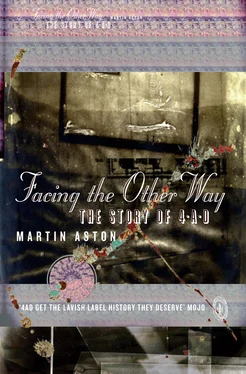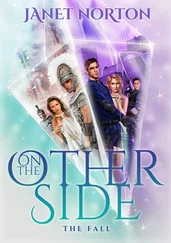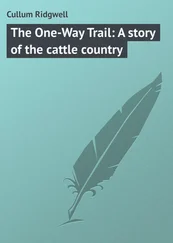In 1972, when they were eighteen, Max and Ivo hatched a plan to move to London, which failed after one day when the friend they hoped to stay with turned them away. A month later, Ivo returned alone. Drawn to High Street Kensington because of its popular hippie market, he spotted a shop on Kensington Church Street called Norman’s with Floyd’s Piper At The Gates Of Dawn (already five years old) in the window. It was run by a father and daughter partnership. ‘The place was shabby and out of time but it still appealed to me, so I asked if they had a job going. By the time I’d got home, the father had called, saying I could help on the record side. I think his plan was to train me to run the shop with his daughter.’
Ivo and two college friends subsequently moved into a basement flat in nearby Earls Court, stricken by damp and frogs in the kitchen, but there’s no place like home. ‘Behind the counter, that was my territory,’ Ivo says, ‘just as behind my desk at 4AD later on. But I was still incredibly shy.’
Six months later, Ivo had had enough of Norman’s. ‘The stock was limited and we’d get asked for a Steely Dan album but we didn’t have a clue because it was only on import. It was a road to nowhere.’ In an early and risky show of self-determination, he left Norman’s and moved in with his sister Tessa’s boyfriend in the nondescript outer west London suburb of Hanwell. One day, exploring the busier streets of nearby Ealing, he found a branch of Musicland, a more clued-in record retailer. After boosting his credibility by asking for the album Alone Together by [Traffic’s] Dave Mason, he asked the manager, Mike Smith, for a job. Smith happened to need an assistant, but he accurately predicted Ivo would be managing his own Musicland branch within two months.
Ivo ran Musicland in the deeply dull suburb of Hounslow – had the Sixties even reached Hounslow, let alone the Seventies? – but he managed to return to Ealing when Musicland – now called Cloud Seven after a takeover – transferred Mike Smith to another branch. It was now 1972, the time of glam rock, a revolution in dazzling sound and satin jackets, which helped British pop escape the cul-de-sac of denim and hard rock, a world of singles as well as albums. But Ealing, with its copious clubs, bars and students, had held on to its Sixties dream, as one of London’s musical epicentres, the birthplace of British jazz and blues where The Rolling Stones had got their first break.
One regular at the Cloud Seven shop was Steve Webbon. A few years older than Ivo, Webbon had boosted his credibility by quizzing Ivo about country rock pioneer Gram Parsons – and then asking about a job. Ivo hadn’t heard of Parsons, but he’d found his assistant.
Steve Webbon currently runs the back catalogue department of both 4AD and Beggars Banquet labels. In the late Sixties, he studied at Ealing Art School, moving on to unemployment benefit and spending most of it in Cloud Seven, in thrall to the sound of west coast American music. Manned by its two Yankophiles, Cloud Seven stocked up on what Gram Parsons had labelled ‘cosmic American music’, before he died, like Tim Buckley, of a heroin overdose. Nowadays, people call it Americana, a repository of roots music that pined for a simpler, humanistic society while rejecting the flash and excess of rock’n’roll. Only in the shape of Bob Dylan and The Band’s return to American roots did British audiences pay attention; in America as well as the UK, Parsons’ raw, Nashville-indebted sound was overshadowed by the softer, sweeter bedsitter folk of the era’s million-selling singer-songwriters such as Carole King and James Taylor.
Next to this, Ivo felt glam rock and its more adult cousin art rock to be inauthentic. ‘It was too “look at me”, too frivolous. I later learnt that there was depth there, and obviously there was something different about David Bowie. But his Ziggy Stardust explosion had put me off, and Alice Cooper and Roxy Music weren’t serious enough either.’
Ivo was happy in his domain behind the Cloud Seven counter: ‘I was having a whale of a time. Until I got mugged, that is.’ It was just before Christmas 1973; the victim of a second mugging that evening died from the attack. Carrying the night safe wallet after shutting up the shop, Ivo was knocked unconscious, landing face first and breaking his nose: ‘I was freaked out, and left London, back home to Oundle, to the womb. But I immediately knew I’d made a stupid mistake.’
After two months, Ivo called Cloud Seven and got a desk job at the company head office. He graduated to conducting impromptu stock checks (to catch potential thieves among the staff) before managing the branch in Kingston, a relatively unexplored satellite town just south of London. Yet it was home to a thriving student campus, and the Three Fishes pub, an enclave of American west coast and southern rock: ‘Everyone wore plaid shirts, drove VW vans and listened to The Grateful Dead,’ Ivo recalls.
The Kingston shop was first on the import van’s route from Heathrow airport, so Ivo was the first to lay his hands on albums such as Emmylou Harris’ Pieces Of The Sky , Tim Buckley’s Sefronia , and Bill Lamb and Gary Ogan’s Portland , pieces of exquisite rootsy melancholia that he’d sticker with recommendations and sell a hundred copies of each. Ivo became especially infatuated with Buckley’s five-octave range and equally audacious ability to master different genres. He began ordering album imports such as Spirit’s The Family That Plays Together and Steve Miller’s Children Of The Future because they had gatefold sleeves, made from thick board; the packaging was part of the appeal, tangible objects to have and to hold. Pearls Before Swine’s use of medieval paintings that were rich in symbolism but gave no indication of the music inside was another alluring draw.
But again Ivo became restless. Once he’d received the Criminal Compensation Board’s cheque for £500 to fix his broken nose, Ivo forwent the operation (it was later paid for by the National Health Service) and went travelling with his friend Steve Brown, hitchhiking through France, taking the train through Spain and then the boat to Morocco, in the footsteps of those who’d sought out premium-grade hashish. After two months of beach-bum life, a cash-depleted Ivo was back in London, seeking work again. Steve Webbon, now managing the Fulham branch of a new record shop, Beggars Banquet, said the owners were looking for more staff.
One of the owners was Webbon’s old school friend Martin Mills. They’d stayed friends while Mills attended Oxford University; Webbon remembers hedonistic nights in student dens, where casual use of heroin was part of the alternative lifestyle, though, he adds, ‘Not Martin, he was more disciplined, not stupid like some others.’ Mills’ room would resonate to west coast classics: ‘The Byrds, Moby Grape, Love, The Doors,’ Webbon recalls. ‘English groups weren’t that inspiring – we were more interested in the next Elektra Records release. That was the kind of record label to follow, and ideally to be part of.’
Elektra had been founded in 1950 by Jac Holzman and Paul Rickolt; each invested $300. During the Fifties and early Sixties, the label had concentrated on folk music, but also classical, through its very successful budget Nonesuch imprint, sales of which helped to fund music of a more psychedelic nature, starting with the bluesy Paul Butterfield Band, Love, The Doors and a nascent Tim Buckley. The Nonesuch Explorer Series was a pioneer in releasing what became known in the Eighties as world music. Put simply, Holzman ran the hippest, coolest, trendiest and also the best record label around. But, like Ivo, he too got restless, and in 1970, Holzman sold his controlling share in Elektra, which became part of the Warner Brothers music group. Holzman stayed in charge until 1972, when it merged with Asylum Records, which specialised in west coast singer-songwriters, from Jackson Browne and Linda Ronstadt to Joni Mitchell and The Eagles. Politics and rivalries under the Warner umbrella made for a bumpy ride, but the quality of the music rarely wavered.
Читать дальше












